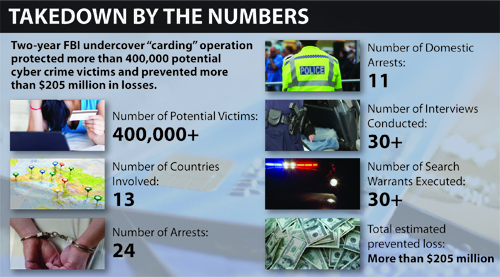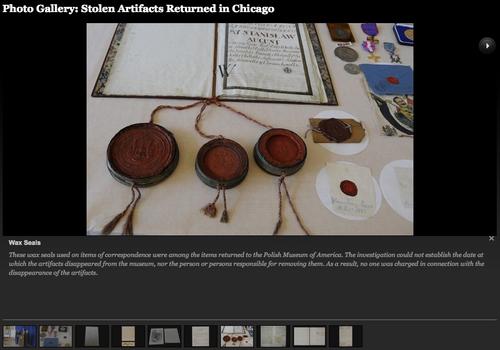News Blog
If It’s Too Good to Be True...Ponzi Scheme Proves Age-Old Adage
If a respected member of your community offered you an investment opportunity, you might consider it. Especially if it’s a man of the cloth. For nearly a decade, Martin Sigillito—a bishop in the ...
If It’s Too Good to Be True...Ponzi Scheme Proves Age-Old Adage
 | |
|---|---|
| Some of the more than 2,000 phony loan agreements seized after Sigillito’s arrest. |
If a respected member of your community offered you an investment opportunity, you might consider it. Especially if it’s a man of the cloth.
For nearly a decade, Martin Sigillito—a bishop in the American Anglican Convocation and a St. Louis attorney—convinced 200-plus people to do more than just consider it: they actually entrusted him with their money to invest in a financial venture. But this venture turned out to be an old-fashioned Ponzi scheme, and in April of this year, Sigillito was convicted of leading a conspiracy that swindled $52 million from victim investors.
Is Your Computer Infected with DNSChanger Malware?
Approximately 64,000 Americans could lose Internet access on Monday, July 9, thanks to a criminal organization that infected millions of computers around the world with malware called DNSChanger. ...
Is Your Computer Infected with DNSChanger Malware?

DNS (Domain Name System) is an Internet service that converts user-friendly domain names, such as www.fbi.gov, into numerical addresses that allow computers to talk to each other. Without DNS and the DNS servers operated by Internet service providers, computer users would not be able to browse websites, send e-mail, or connect to any Internet services.
After announcing criminal indictments and seizing the rogue servers last November, the FBI obtained a court order and worked with a non-profit to set up temporary clean DNS servers for victims affected by the DNSChanger malware. But, says Supervisory Special Agent Thomas Grasso of our Cyber Division, “On July 9, we’re going to be turning off those servers. We’ve been using the last eight months to go out and clean up the infected computers, but we don’t have everybody.” Grasso says he hopes that people “follow our recommendations to: one, determine if they’re affected by this; and then two, fix the problem.” For more information, visit the links below or www.dcwg.org.
More details
Check your computer’s DNS settings
Learn about DNSChanger malware and how it can affect your computer (pdf)
Register as a victim of the DNSChanger malware
Related FBI, This Week podcast
Journey Through Indian Country, Part 5
The arrest of a 20-year-old Zuni woman for selling two baggies of cocaine that each contained less than one gram of the drug might be considered a minor offense in many jurisdictions—but in Indian ...
Journey Through Indian Country, Part 5
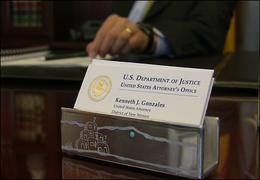 | |
|---|---|
The arrest of a 20-year-old Zuni woman for selling two baggies of cocaine that each contained less than one gram of the drug might be considered a minor offense in many jurisdictions—but in Indian Country, federal prosecutors are taking a different approach.
“We have zero tolerance for drug trafficking in Indian Country,” said Ken Gonzales, New Mexico’s U.S. Attorney. Because drugs fuel serious crimes on the reservation, and because public safety is at stake, Gonzales sees the no tolerance program as a key part of efforts to fight crime on the reservations.
“The Department of Justice can do a lot to prosecute crime,” Gonzales said. “With the help of the FBI, the Bureau of Indian Affairs, and our local tribal law enforcement partners, we can investigate and take troublesome people out of the community for extended periods of time. In that way, we are also doing a lot to prevent crime. It’s all part of our overall anti-violence strategy.”
Inside Denver’s JTTF, Part 1: Vigilance Against Terrorism
It was September 2009—a few days before the eighth anniversary of the 9/11 attacks—when the Denver Joint Terrorism Task Force (JTTF) received word that a Colorado resident and al Qaeda recruit was ...
Inside Denver’s JTTF, Part 1: Vigilance Against Terrorism
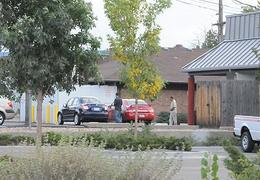 | |
|---|---|
| Surveillance photo of Najibullah Zazi and his father |
It was September 2009—a few days before the eighth anniversary of the 9/11 attacks—when the Denver Joint Terrorism Task Force (JTTF) received word that a Colorado resident and al Qaeda recruit was about to carry out a major terrorist attack. The jihadist needed to be located with the utmost urgency.
Using the JTTF’s multi-agency approach to conducting investigations and gathering and sharing intelligence, task force members located Najibullah Zazi and helped track him to New York City, where he intended to become a suicide bomber in the subway system around the time of the 9/11 anniversary. Zazi’s self-described plot to “weaken America” by killing innocent subway riders has been characterized as one of the most serious terrorist threats to the U.S. since the 9/11 attacks.
The plot was foiled thanks to an all-out effort by law enforcement and intelligence agencies around the world. Much of that effort was focused through Denver’s JTTF, which is comprised of more than 20 local, state, and federal agencies.
Read Part 1 of series for more details, including video interview with head of FBI Denver
FBI Updates Congress on Threats Involving Insiders, Illegal Transfer of U.S. Technology
FBI Counterintelligence executive C. Frank Figliuzzi briefed members of a House subcommittee on our efforts to disrupt economic espionage activity in the U.S., which—based on our pending cases—has ...
FBI Updates Congress on Threats Involving Insiders
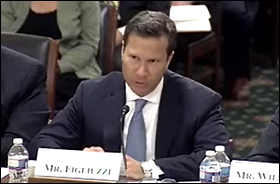 | |
|---|---|
| C. Frank Figliuzzi, assistant director of the Counterintelligence Division, briefs members of Congress. |
FBI Counterintelligence executive C. Frank Figliuzzi briefed members of a House subcommittee on our efforts to disrupt economic espionage activity in the U.S., which—based on our pending cases—has resulted in losses of more than $13 billion to the American economy. Figliuzzi highlighted two growing threats: the willingness of so-called insiders to steal trade secrets and other proprietary information and hand it over to foreign entities; and the illegal transfer of U.S. technology, which could potentially end up in weapons of mass destruction.
The hearing, titled “Economic Espionage: A Foreign Intelligence Threat to Americans Jobs and Homeland Security,” also featured officials from the Department of Homeland Security’s Immigration and Customs Enforcement, the U.S. Patent and Trademark Office, and the U.S. Government Accountability Office. Figliuzzi noted that the “partnerships represented at this hearing”—coupled with public awareness—are a vital component to combating economic espionage.
International Cyber Crime Takedown Targets “Carding”
Two dozen people around the world were arrested today as part of the largest coordinated international law enforcement action in history directed at “carding” crimes—offenses in which the Internet is ...
International Cyber Crime Takedown Targets “Carding”
Two dozen people around the world were arrested today as part of the largest coordinated international law enforcement action in history directed at “carding” crimes—offenses in which the Internet is used to traffic in and exploit the stolen credit card, bank account, and other personal identification information of victims.
The takedown was the result of a two-year undercover operation led by the FBI that revealed a network of cyber criminals engaged in activities such as buying and selling stolen identities, exploiting credit cards, and using counterfeit documents and sophisticated hacking tools.
In the course of the undercover operation, the FBI contacted multiple affected institutions and/or individuals to advise them of discovered breaches in order to enable them to take appropriate responsive and protective measures. In so doing, the FBI has prevented estimated potential economic losses of more than $205 million, notified credit card providers of over 411,000 compromised credit and debit cards, and notified 47 companies, government entities, and educational institutions of the breach of their networks.
Operation Cross Country
In the continuing effort to address the national problem of child sex trafficking, the FBI and our partners today announced the results of a three-day law enforcement action in which 79 child victims ...
Operation Cross Country

Operation Cross Country VI, part of the Bureau’s Innocence Lost National Initiative, was conducted with the assistance of more than 8,500 local, state, and federal law enforcement officers representing 414 separate agencies. To date, 47 Innocence Lost Task Forces and working groups have recovered more than 2,200 children from the streets. The investigations and subsequent 1,017 convictions of pimps, madams, and their associates who exploit children through prostitution have resulted in lengthy sentences—including multiple sentences of 25 years to life in prison—and the seizure of more than $3 million in assets.
“Child prostitution remains a major threat to children across America,” said Kevin Perkins, acting executive assistant director of the FBI’s Criminal, Cyber, Response, and Services Branch. “It is a violent and deplorable crime, and we are working with our partners to disrupt and put behind bars individuals and members of criminal enterprises who would sexually exploit children.”
Read the full story, which includes raw video from the sweep
Stolen Artifacts Returned in Chicago
Approximately 120 stolen historic artifacts valued at roughly $5 million were returned to the Polish Museum of America in Chicago earlier this week. The artifacts, which were believed to have been ...
Stolen Artifacts Returned in Chicago
Approximately 120 stolen historic artifacts valued at roughly $5 million were returned to the Polish Museum of America in Chicago earlier this week. The artifacts, which were believed to have been removed from the museum sometime in the 1970s or 1980s, were recovered by the FBI in 2011 from a Chicago residence.
The artifacts consist of many items of correspondence dating back as far as 1646, to include letters sent to and from Polish kings, American presidents, a French emperor, and prominent Revolutionary War figures. The collection also includes rare prints and sketches, Polish military medals and memorabilia, as well as World War II artifacts.
For more details on the investigation into the stolen artifacts, read the press release issued by our Chicago Field Office. And visit our art theft program page for information on other art crimes, the National Stolen Art File database, and our dedicated Art Crime Team, which—since its establishment in 2004—has been responsible for the recovery of more than 2,650 items valued at over $150 million.
Journey Through Indian Country, Part 4
From the most basic task of finding a crime scene to more complicated matters regarding language and cultural barriers, FBI agents in Indian Country depend on their local, federal, and tribal law ...
Journey Through Indian Country, Part 4

“Sometimes agents expect to see street numbers and paved roads,” said St. Germaine, who was born and raised on the reservation. “Out here, you make one wrong turn at an isolated place and go a few hundred feet and you can get very lost very quickly.”
“And when the sun goes down,” said Malcolm Leslie, another Navajo criminal investigator, “in some places on the reservation you can’t see your hand in front of your face.”
From the most basic task of finding a crime scene to more complicated matters regarding language and cultural barriers, FBI agents in Indian Country depend on their local, federal, and tribal law enforcement partners. And our partners rely equally on us—for expertise, training, and other resources. “I don’t think one can do without the other,” said St. Germaine.
Another Assault Linked to Potomac River Rapist
On the night of July 20, 1996, a woman was sexually assaulted as she was walking in the Palisades neighborhood of Northwest Washington, D.C. A composite sketch of the suspect was produced and leads ...
Another Assault Linked to Potomac River Rapist
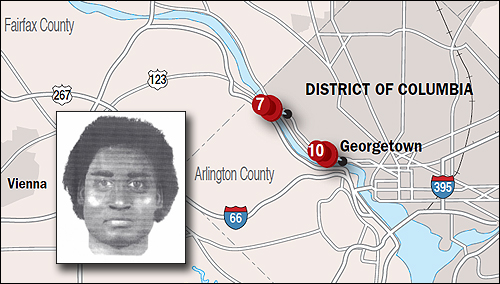 |
|---|
| Sketch of suspect and map reflecting location (pushpin 7) of 1996 assault recently linked to the Potomac River Rapist. |
On the night of July 20, 1996, a woman was sexually assaulted as she was walking in the Palisades neighborhood of Northwest Washington, D.C. A composite sketch of the suspect was produced and leads were followed, but the case eventually grew cold.
Now, nearly 16 years later, forensic evidence from that incident has been linked to a single suspect believed to be responsible for nine other sexual assaults in the area between 1991 and 1998. One of those attacks resulted in the murder of the victim.
Known as the Potomac River Rapist, this violent and brutal assailant is still on the loose. In partnership with the Montgomery County Police Department in Maryland and the Metropolitan Police Department and U.S. Attorney’s Office in Washington, D.C., we launched a web campaign in December 2011 to help bring renewed attention to the case. And in light of this most recently linked piece of the puzzle, we have updated our map to reflect the location of the 1996 assault and have added the related composite sketch to our photo gallery as well.
A reward of up to $25,000 is being offered for information leading to an arrest and conviction in the Potomac River Rapist case. Although it’s been several years since his last attack, our efforts to find him have not diminished. Please review all of this information and see if you can help.
Potomac River Rapist: Photo Gallery | Map & Timeline
Press release from Metropolitan Police Department





